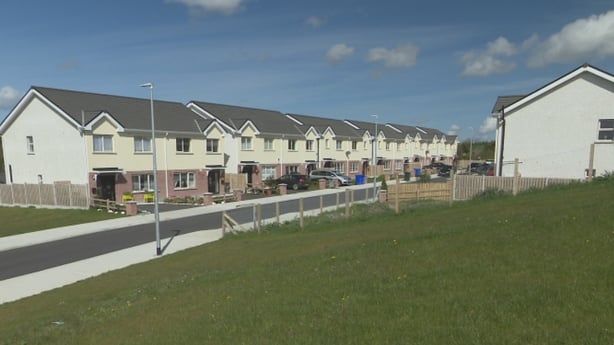The Housing Commission has called for a "radical strategic reset of housing policy" and has estimated an underlying housing deficit in Ireland of up to 256,000 homes.
The expert body was established as part of the Programme for Government to examine housing issues, such as supply.
In its report, submitted to Minister for Housing Darragh O'Brien earlier this month, the commission points to "ineffective decision making and reactive policy making where risk aversion dominates".
The document has been seen by RTÉ News, and it runs to over 200 pages with more than 80 recommendations.
The report builds upon many of the recommendations contained in the executive overview, which were reported upon earlier.
In one section, looking at housing affordability, the commission identifies Wicklow, Dublin, and Kerry as the counties with the greatest affordability challenges for first time buyers.
It compares average house prices in these counties with the average income of couples.
Separately, the Commission finds no borrower-led evidence that a more generous version of the Government's Help to Buy Scheme would have an inflationary impact on house prices.
However, it recommends that such schemes should be review and recalibrated regularly, to take account of detailed evidence on income distribution, affordability, supply dynamics and regional differences.
In the area of social housing, it recommends that the Department of Housing urgently reform current procedures to remove barriers to delivering social housing.
This includes making funding approval and procurement procedures easier.
In terms of the establishment of a "Housing Delivery Oversight Executive", it says that it should comprise a board, executive and secretariat of people with the necessary experience and expertise, drawn from both public and private sectors.
The Housing Commission Report calls for a specific Social Housing Act, separate from other housing legislation, to protect the social housing sector and prohibit privatisation.
It says it should be similar to legislation adopted in Austria and France.
The Commission recommends merging social and cost-rental housing over time to form a single affordable rental sector, based on the principle of cost recovery, that will accommodate both low-income households and some middle-income groups.
In relation to rural housing, it calls on the Government to promote multigenerational housing strategies to reduce rural isolation among older people.
It also calls for reform of the planning system to provide clear, consistent and equitable protocols for sustainable rural housing.
A Planning Bill, to reform the planning system, is currently making its way through the Oireachtas.
Speaking in the Dáil earlier, Taoiseach Simon Harris said the Government will publish the full Housing Commission report this week.
It followed comments from Sinn Féin leader Mary Lou McDonald who said that the commission report was a "damning indictment" of the failure of Government policy.
She said that the report "wouldn't have seen the light of day if RTÉ hadn't broken the story".
During Leaders Questions, Mr Harris said that any fair analysis would show progress on housing delivery.
He said that it was always the Government's intention to publish revised housing targets, but that it needed time to consider its findings, adding that over 30,000 new homes have commenced construction so far this year.

The report's executive overview calls for "emergency action" to address the "housing deficit".
In another section of the report examining Ireland's housing requirement, the commission estimates that the underlying housing deficit ranges from 212,500 to 256,000 homes based on 2022 Census figures.
This refers to "pent-up demand" in the system, before other factors such as future population growth and inward migration are considered.
Mr O'Brien said that there may be a drop in the number of housing commencements in the near future.
Speaking during statements on the Government's housing policy in the Dáil, he said: "We may see a dip in future commencements in the short-term, as the focus shifts to progressing those newly started developments toward completion."
However, he insisted that housing is a priority for the Government, adding that "Housing for All is working". The policy is addressing "the root causes" of the housing crisis, he claimed.
Mr O’Brien cited a report which predicts that construction will increase "by 4.4% in this country, whereas it's expected to fall by 2.1% in other EU countries".
'Emergency delivery' required
The report states that "emergency delivery" is required to meet this deficit.
It takes a mid-range figure of 235,000 homes (between 212,500 to 256,000) as the "emergency" level required between 2025 and 2034.
Based on these figures, an annual average of 23,500 homes would have to be delivered just to address the deficit, before future housing requirements are considered.
It is understood that this annual target, to address the deficit, would have to be delivered in addition to existing housing delivery plans.
Under the Government's Housing for All targets, an average of 33,000 homes are due to be delivered between 2022 and 2030.
This would mean that the average annual delivery of homes between 2025 and 2034 would need to be in excess of 56,000 units.
The commission also estimates the required delivery level if the average household size reduces to 1.9 persons and the population increases to 7.25 million by 2050.
In such a scenario an average of 81,400 homes per annum would be required.
However, it also shows that if their average household size is 2.4 persons and the population only increases to 6.25 million people, then an average of just 33,400 homes per annum are required.
The Housing Commission calls for a "targeted increase in the proportion of social and cost-rental housing to 20% of the national stock".
According to the commission, the current household size in Ireland is artificially elevated due to housing scarcity.

'One of the poorest outcomes in Europe'
It also finds that "Ireland has, by comparison with our European partners, one of the highest levels of public expenditure for housing, yet one of the poorest outcomes".
It believes that while specific details in relation to housing delivery can be "complex, the overall strategy to successfully achieve a sustainable housing system is not complicated".
However, it acknowledges "several pressing issues currently affecting housing in Ireland, such as high inflation in the construction industry, delays in the planning system and acute pressures on the availability of accommodation".
It adds that the "focus of the commission is long-term, the recommendations outlined in this report are aimed at shaping housing policy into the future".
According to the commission, funding in the order of €16-€20 billion per annum is required to deliver the required level of housing, adding that this should come from both public and private sources.
In the last budget, the Government allocated almost €7 billion to the Department of Housing, of which €5.1 billion was to be spent on capital projects.
In 2022, the Government estimated that there was approximately €6 billion worth of private development funding in the market each year.
This report from the Housing Commission recommends that a significant increase in private and public funding is required.
The Housing Commission was established by Mr O'Brien in 2021. Among its 14 members were Professor Ronan Lyons of Trinity College Dublin and Daft.ie.
Former ICTU general secretary Patricia King and property developer Michael O'Flynn were also on the commission.
It held over 200 meetings and heard from more than 70 housing and industry experts during its term.
Report on housing referendum
Separately, the commission also prepared a report on proposed wording for a referendum on housing, which was submitted to the minister last year.
A minority report on the same subject was also submitted to the minister, which was supported by three members of the Commission.
A spokesperson for the Minister for Housing said: "The minister received the Housing Commission report and recommendations this month which he will consider before bringing to Cabinet in the coming weeks.
"To allow Government plan properly for housing supply, including infrastructural and capital demands, it is essential to develop projections for overall housing demand, the spatial nature of projected housing provision and the overall proportions of that provision to be provided as social homes, affordable homes or market provided homes (for purchase or rent).
"As planned, Housing for All targets are being reviewed having regard, among other things, to Census 2022 data published last year – this review is well advanced with revised targets expected in Q3 of this year."






